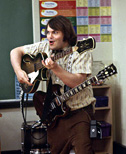
Movie Guru Rating:

Comment
on this review
| |

In School of Rock, Jack Black slacks, once again
by Scott McNutt
A riddle for rock 'n' roll fans and appreciators of mildly entertaining cinema: What's worse than a rocker who refuses to die before he gets old, but no worse than every follow-up to Up in Smoke Cheech and Chong ever made? The answer is School of Rock, a tepid fable starring Jack Black as...suspenseful pause here...an aging slacker, a stereotypical, counterculture "rebel" who won't give up his rawknroll fantasies because "one great rock show can change the world."
Dewey Finn (Black) is a mediocre musician who plays gigs with his band by night and by day mooches off his milquetoast roomie, Ned (Mike White, who also wrote the screenplay), who supports them working as a substitute teacher. Both guys are comfortable with this arrangement, but Ned's overbearing girlfriend Patty (Sarah Silverman) insists Dewey start paying rent. Things come to a head when Dewey's band fires him because of his self-indulgent guitar solos. To make some bucks fast, he assumes Ned's identity and subs as a fourth-grade teacher at a posh prep school.
Our "hero" ignores the tykes in his charge until he overhears them perform during music lessons. Their talent inspires him to hatch a scheme. He'll transform these fourth graders into the band he's always wanted (that is, one over which he has complete creative control), win an upcoming "Battle of the Bands" contest, seize the $20,000 prize, pay off his debts, and give the finger to everybody who ever doubted him. To make his dream come true, all he has to do is develop some killer songs, con the kids into cooperating, avoid the scrutiny of the school principal (Joan Cusack, in a wasted role), keep the con from the kids' parents, and avoid tipping Ned to his stolen identity.
School has been described as uplifting and as a feel-good movie, but it would be more accurate to call it a "barely upright, feel-mild" movie. Viewers approximately the same chronological age as the kids in the movie may be uplifted by its sham message of rebellion, and viewers approximately the same mental age as Dewey Finn may feel good about Dewey's antics.
For those who demand somewhat more of their cinematic entertainment (or simply don't care for Jack Black), School is a check-the-watch-every-10-minutes exercise in tedium. It's predictable, superficial, and stereotypical, yet attempts to be politically correct.
Of course the loud, abrasive kid becomes the drummer. Of course Dewey persuades the officious teacher's pet to cooperate by naming her the "band manager." Of course the shy, overweight girl turns out to be a great singer. Of course the kid with the guitar chops has a father who disapproves of rock music. Of course the class is composed of African Americans, whites, Asians, etc., etc.—there's even a mincing and petulant (read "gay") kid who becomes the group's costume designer (of course). And, of course, Dewey Finn, with his spurious "stick-it-to-the-man, show-'em-who-you-really-are" sentiments, inspires the kids to both exercise their individual talents and work together as a band.
Any number of movies have applied the "rag-tag losers band together to overcome impossible odds" formula to better effect, from The Bad News Bears to The Commitments to—oh, hell, even Major League was better. And School's makers (White and director Richard Linklater) must hope its viewers have seen those movies, because School relies on audiences' knowledge of analogous films to fill gaps in its own credibility.
For instance, the kids in School of Rock aren't rag-tag or even losers; c'mon, they're pampered attendees of an elite prep school. If they have been repressed, it isn't evident, and the movie doesn't attempt to show it, except in a couple of brief scenes with one kid's dad. But (the moviemakers seem to say), you know from other movies that these kids are supposed to be rebels, so just buy into this, please? Just accept as benign Dewey's exploitation of the class for his own ends, OK?
Similarly, rather than making the Dewey Finn character earn viewers' trust and sympathy, the movie depends upon audience familiarity with Jack Black's variations on his slacker-with-a-heart-of-gold character.
While School's current box-office bonanza suggests Black still has sufficient rapscallion charm to pull it off this time, if one looks at Dewey Finn without the prism of Black's previous roles, the character isn't particularly pleasant. His behavior doesn't have enough context within the movie to be either endearing or amusing. He's more like the kid who regularly rakes his fingers across the chalkboard. Maybe he's got legitimate reasons for his actions, but if you don't know his back-story, he's simply an annoying little reprobate.
School of Rock is occasionally amusing (though there isn't a single line in it funny enough to be memorable). It's also harmless, because both the plot and Black's character are too ridiculous to be taken seriously, and because the selfish and self-serving Dewey admits (in scenes as emotionally authentic as any song Boston ever recorded) he was wrong to deceive his friends, his employer, and his class. And everybody lives happily ever after. It is a fantasy, after all.
If that's what entertains you, Middle America (as apparently it is), then this is one cool flick. It's hip. It's down. It rawkz. Only, not so much, really.

October 9, 2003 * Vol. 13, No. 41
© 2000 Metro Pulse
|





